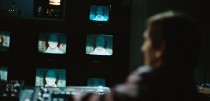Andy Arnold gained his status as a mover in Glasgow performance when he rescued The Arches from post City of Culture closure. Despite housing one of the less successful ventures of 1990, The Arches went on to become a multi-arts space, spearheading Glasgow’s clubbing scene, supporting new work, giving Ian Smith a chance to kick-start Mischief La Bas and, through Arnold’s own inspired direction, the natural location for Beckett’s absurdist comedies.
His arrival at the Tron was a bold step for both theatre and director. After a few rocky years, the venue was caught between a populist past and a commitment to new, exciting work. Its annual pantomime, for example, is a Glasgow institute, and is nothing like any other pantomime in the UK. Yet across the year, it struggled to maintain a distinctive identity between the other theatres.
Arnold set to work immediately: within a year, he has instituted a new festival – Mayfesto – opened up the smaller spaces for younger companies, picked up praise for his direction of tough-talking scripts and reconceived The Tron as more than just a theatre. Taking advantage of the bar space, he has hosted cabarets, including Tam Dean Burn’s political variety, Lost in Digression and the old favourite Supper Club. Current advertising makes it clear that The Tron is more than just a theatre, but a restaurant, bar, community and gig venue rolled into one.
The theatre at the Tron follows a variety of strands. There are touring companies, visiting from across Scotland – recent guests have included Dogstar and Vox Motus. There are Tron company works, sometimes directed by Arnold himself, as in his successful Drawer Boy. Local companies such as Flatrate occupy the upstairs Counting House, while the Victoria bar has at least one variety night a month. Meanwhile, through their artist in residence Leann O’Kasi, they have one of the sharpest new directors already on call.
At the same time, The Tron has been experimenting with new ways of commissioning plays: a competition in association with the National Theatre of Scotland , Open Stage, led to the development of three new plays from established authors – including CATS award winner Rob Drummond – and the winning entry, Sea and Land and Sky by Abigail Doherty premiered in October.
The energy and diversity of The Tron’s approaches and programming is perhaps best expressed through Arnold’s Mayfesto. Partially a revival of the old Glasgow Mayfest, it took a consciously political attitude to theatre, including work that discussed everything from Israel’s occupation of the Left Bank through to the interrogation techniques of the War Against Terror. With two or three plays per evening, it built into a comprehensive festival of political performance, accessing a wide variety of opinions and voice, and turning the bar into a late night mixture of a social networking club and discussion chamber.
Like many of the other theatres, The Tron expresses a particular strand of Glaswegian performance. Concentrating on the script perhaps more than The Arches or Tramway, it gives time to new writers and directors, and produces modern successes alongside new work. It still has a determinedly popular edge, but still has space for those awkward customers who insist on pushing the boundaries – rather like Arnold himself.














Comments